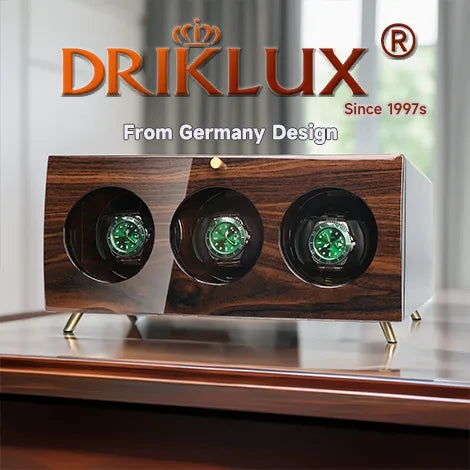"My Watch Still Stops in the Winder!" - 7 Advanced Reasons and Fixes
It is one of the most common frustrations for any automatic watch owner: you have invested in a quality winder, yet your timepiece still stops. This guide addresses this issue head-on, moving beyond the basics to provide an in-depth troubleshooting guide with seven advanced reasons your watch might be stopping and the practical fixes you need to solve the problem for good.
Essential Winder Troubleshooting
Understanding these core issues is fundamental for any watch collector, ensuring your timepieces get the care they deserve.
Reason 1: Incorrect Turns Per Day (TPD) or Direction
The most common culprit for a watch stopping in a winder is an incorrect setting. Every automatic movement has a specific requirement for Turns Per Day (TPD) and winding direction (Clockwise, Counter-Clockwise, or Bidirectional) to stay powered. If the TPD is too low, the watch won’t receive enough energy.
The Fix: Your first step in any watch winder troubleshooting is to verify the correct settings for your specific watch model.
- Check the Manual: Your watch's manufacturer provides the most accurate TPD and directional winding information.
- Consult an Expert Guide: For a comprehensive list of settings for hundreds of brands, from Rolex to Seiko, consult our Ultimate Watch Winding Guide.
Find a winder with the right settings in the Driklux Collection
Reason 2: The Watch Is Not Securely Seated
 If the watch is loose in the holder, the winder's rotation may not effectively engage the watch's internal rotor. The watch needs to be snug and secure for the kinetic energy to be transferred properly.
If the watch is loose in the holder, the winder's rotation may not effectively engage the watch's internal rotor. The watch needs to be snug and secure for the kinetic energy to be transferred properly.
The Fix: Ensure the watch pillow fits your watch bracelet or strap snugly. The watch should be firmly seated in the winder's drum, with no slipping or wobbling as it turns. Driklux winders feature versatile, secure pillows designed to hold timepieces of all sizes firmly in place.
Advanced Mechanical and Power Issues
If the settings are correct, it's time to look at the hardware itself.
Reason 3: Unstable Power or Failing Batteries
An inconsistent power supply is a simple but often overlooked issue. A flickering connection or dying batteries will cause the winder to stop intermittently, leading to an unwound watch.
The Fix: Check that the AC adapter is securely plugged into both the winder and the wall. If you are using a battery-powered model, replace the batteries with a fresh, high-quality set. For ultimate reliability, using the AC adapter is always the recommended primary power source.
Reason 4: Winder Motor or Mechanical Failure
Like any machine, the motor in a watch winder can wear out over time, especially in lower-quality models. A failing motor may stop, stutter, or make noise, all of which will prevent proper winding.
The Fix: If you suspect a motor failure, it may be time for an upgrade. Investing in a winder with a high-quality, silent motor, like those engineered for every Driklux watch winder, ensures years of reliable and near-silent performance.
Reason 5: The Watch Itself Needs Service
If you've tried multiple winders and settings, the issue may lie with the watch. An automatic watch that requires service may have a problem with its power reserve or winding mechanism, preventing it from holding a charge.
The Fix: Take your timepiece to a certified watchmaker for an inspection. They can diagnose issues with the mainspring or movement that could be the root cause of the problem.
Environmental and Maintenance Fixes
Sometimes the solution is in the winder’s environment or condition.
Reason 6: Obstruction or Debris
Dust or debris inside the winder mechanism can impede its rotation.
The Fix: Keep your winder clean and covered when not in use. A gentle wipe-down and a can of compressed air can clear out any debris that may be hindering the winder's movement. For more tips, read our guide on winder maintenance.
Reason 7: The Winder Is Overheating
Some winders have a thermal protection circuit that will temporarily shut down the motor if it overheats.
The Fix: Ensure your winder is placed in a well-ventilated area, away from direct sunlight or other heat sources. If it stops, let it cool down completely before restarting it.
The Final Verdict: Ensure Peak Performance
By systematically working through this troubleshooting guide, you can solve nearly any issue of a watch stopping in its winder. Ensuring your winder is correctly configured and properly maintained is the key to protecting your collection. For a solution built for reliability, explore the Driklux collection of advanced, silent-motor watch winders.
HOW OUR CUSTOMERS ARE TREATED:
Loyal customers not only come back, they don't just recommend you, they insist that their friends buy from you.. Profit in business comes from repeat customers; customers that boast about your product and outstanding service
















